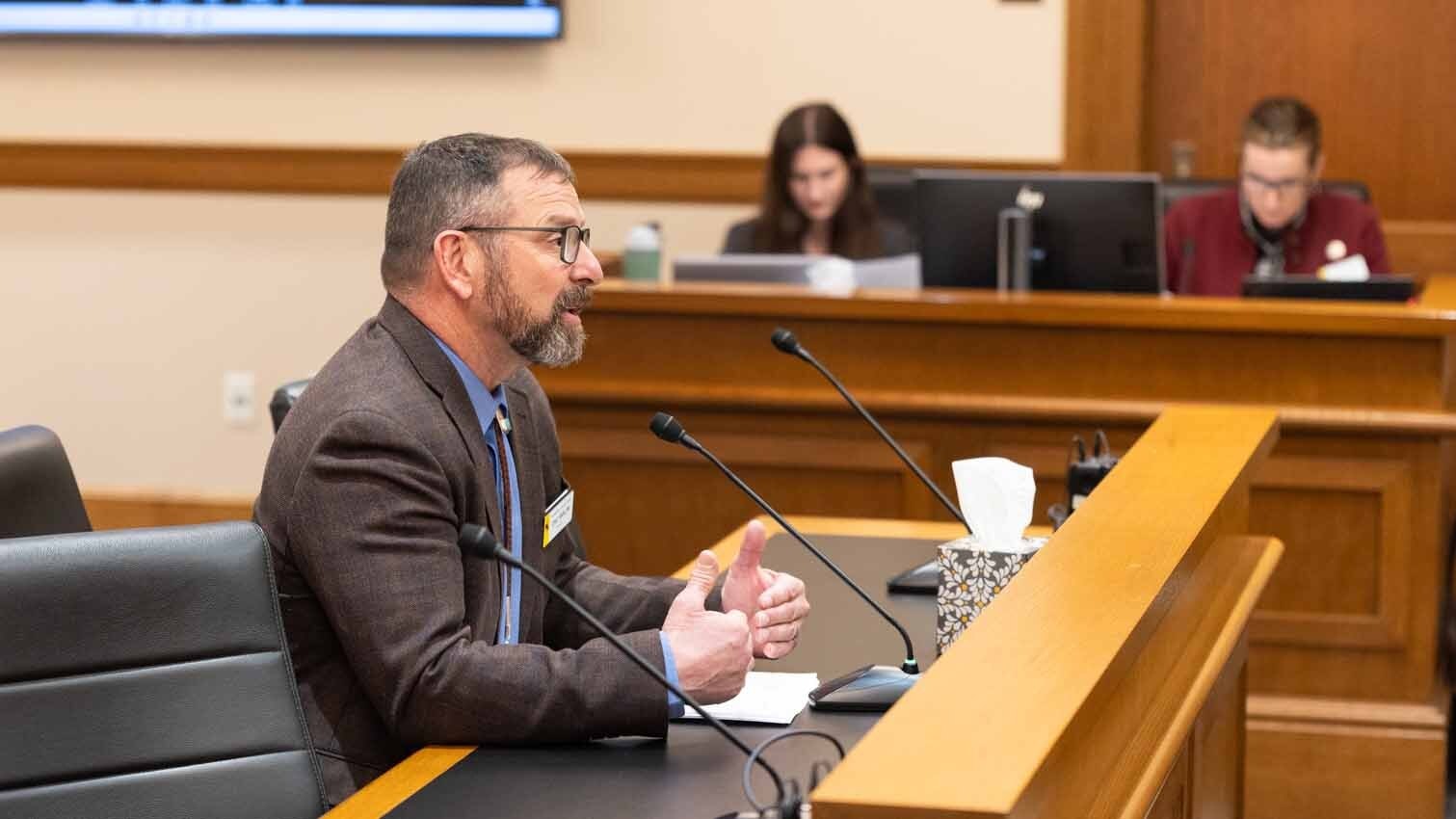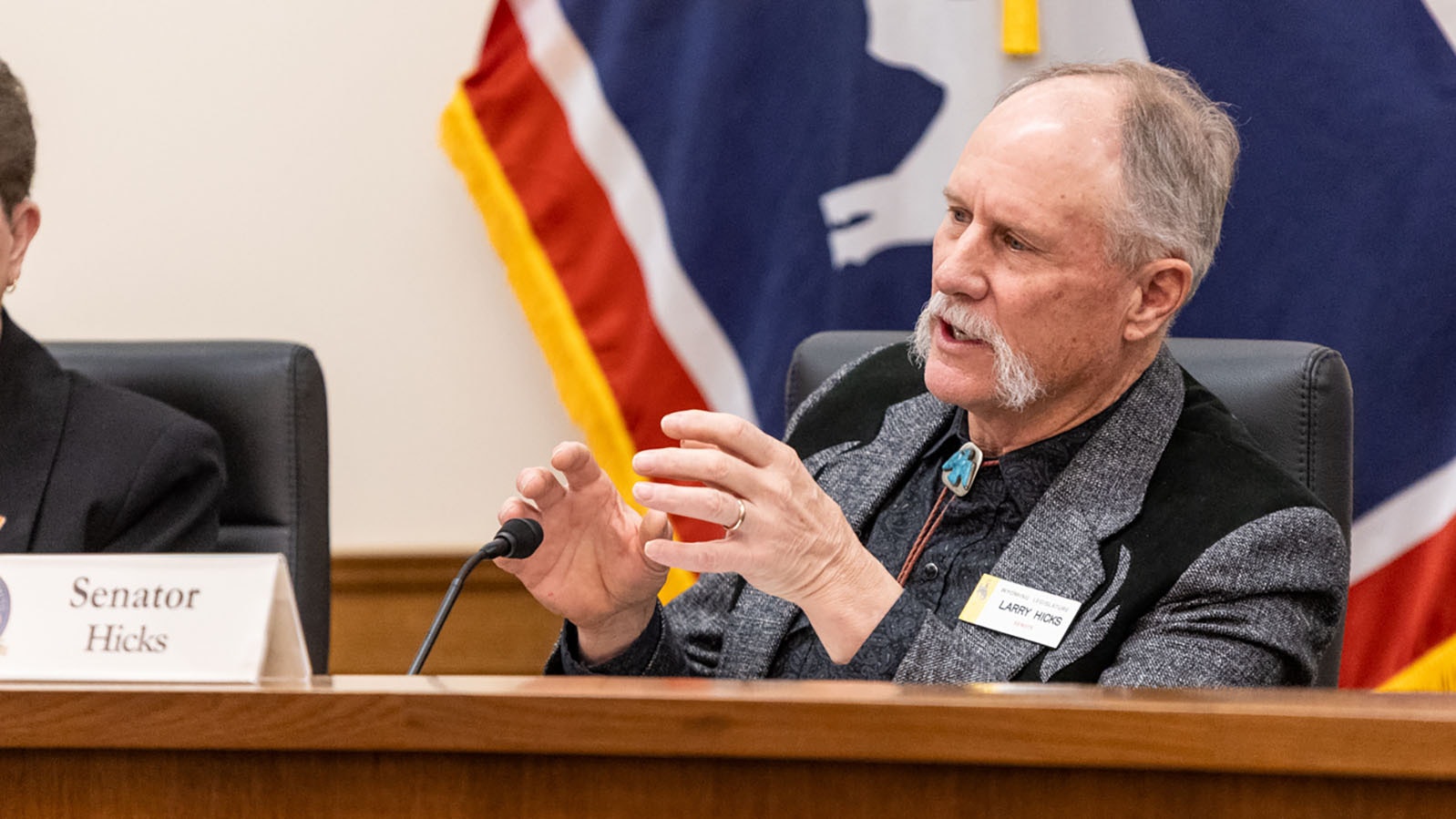Within about 19 hours of Gov. Mark Gordon releasing his proposed budget for the upcoming biennium, Secretary of State Chuck Gray announced he was “alarmed and deeply troubled” by what Gray cast as an attempt to prevent a ballot initiative.
State Treasurer Curt Meier, conversely, who has been reveling in his office’s record-high investment revenues of $1.86 billion for the recent fiscal year alone, celebrated Gordon’s budget request Tuesday.
Gray’s Budget $200K Shy Of His Ask
Gordon on Monday afternoon unveiled a proposed $11.13 billion budget for the upcoming biennium, which the governor called a measured approach to keeping up with inflation, fighting wildfires at home, battling other governments for water rights, keeping health care accessible and catching state employees up to appropriate pay levels.
Gray’s office was budgeted in 2025-26 for $9.52 million. The secretary asked for $10.45 million for the upcoming biennium.
Gordon is proposing Gray’s office receive $200,000 less than his requested $10.45 million.
It’s a lighter proposed gouge than some other agencies face, such as the Department of Revenue, which the governor recommended to receive $13.1 million less than its $106.68 million ask; or the Community College Commission, which Gordon foresees at $19.8 million less than its request.
According to Gray, Gordon is shorting him of “statutorily required publication costs” for alerting the public of a 2026 ballot initiative to cut property taxes 50% in addition to the 25% cut lawmakers passed earlier this year.
Gordon’s answer to that is essentially, money is money, and Gray managed to fulfill his publication requirements on his past, smaller budget.
‘Deeply Troubled’
Gray’s statement reached Cowboy State Daily’s inbox at about 11 a.m., not quite a day after Gordon’s 4 p.m. Monday budget release.
“I am alarmed and deeply troubled by Governor Gordon blocking the budget request for the legally required publication requirements for the People’s Initiative to Limit Property Taxes,” the statement quotes Gray as saying.
Gordon is not budget maker of Wyoming, though he does have some discretion over state projects. Rather, the Legislature, led by its appropriations committees, determines the budget.
Gray touted the ballot initiative as a pivotal mechanism and an example of “the people’s right to propose and enact laws by initiative to address fundamental issues, such as property tax reduction.”
The People’s Initiative to Limit Property Taxes, wrote Gray, is a duly certified initiative that his office has certified to appear on the 2026 ballot, as the state Constitution outlines, after more than 30,000 Wyomingites signed petitions to see it on the ballot.
State law requires Gray’s office to advertise the initiative in every Wyoming county for 12 weeks prior the election. Gray had asked for $125,000 to accomplish that.
“The governor’s denial of our budget request to conduct this process leads me to believe he is trying to prevent the legally required process for conducting the initiative from being carried out, which would open it up to legal challenges,” said Gray.
Gray accused Gordon of pursuing his own opposition to property tax reduction.
‘Gray’s Claims Are False’
Gordon responded in a Tuesday statement to Cowboy State Daily.
“Secretary Chuck Gray’s claims are false,” wrote Gordon. “My recommendation does nothing to block the legally required publication of this initiative.”
The proposed budget, rather, rejects a request for extra money for publication costs, “to carry out the same statutory duty (Gray) did two years ago when no additional funds were requested.”
The Wyoming Legislature in 2024 placed “Constitutional Amendment A” on the ballot, to separate residential property taxes into their own category on the state Constitution. The voters approved that.
Wyoming law requires the secretary of state to provide public notice for both referendums, which are questions the Legislature puts on the ballot, and initiatives, which are questions by the people.
Gray didn’t ask for extra money for that advertising burden in his 2025-26 biennial request, Gordon’s office wrote in the statement. So, Gordon planned his current budget request on Gray’s own process of covering his advertising burdens with his existing budget, the statement adds.
“My budget process has been completed as it always has been — fairly, transparently, and fiscally conservative,” Gordon said. “If the Secretary believes he needs more money than he has before to impartially execute his constitutional duties, he can, as he has done previously, explain that to the Appropriations Committee.
"That is how the process works. My job is to safeguard both the Constitution and the checkbook. This recommendation does exactly that.”
Gray’s statement says he does plan to approach the legislative Appropriations Committee in two weeks.
Still Flush Over Here
Meanwhile, Meier dispatched a Tuesday statement praising Gordon’s plan, calling it “fiscally responsible,” celebrating his own office’s record-high investment revenues, and warning that the influx isn’t all for spending.
He also proposed an alternate strategy for rerouting some of Wyoming's investment revenues into long-term investing, as an income stabilizer.
Gordon’s plan “is in step with the Treasurer’s vision for a State that eventually should not need to worry about whether the oil, gas and minerals segment is in a boom or bust cycle,” wrote Meier’s office.
Meier referenced the widely-reported Consensus Revenue Estimate Group (“CREG”) report, which says Wyoming reached record investment earnings this fiscal year.
“Our investments generated $1.86 billion, beating returns from severance taxes and federal mineral royalties combined," he noted.
Meier said strategies his office’s investment team used have achieved high watermark earnings for the sixth time within his tenure, thereby helping the state grow its “nest egg for future generations.”
Still, added the statement, not all of the influx is for spending. Much of it is earmarked as savings cushion for expenditures to which the state has already committed.
Some must go to the Commons School Permanent Land fund, some to the Hathaway Scholarship fund, some for the Workers’ Compensation fund, among others.
“It is important to recognize that these earnings help provide vital services to the citizens of Wyoming and keep individual tax contributions at a minimum,” Meier said. “This year’s investment earnings are a great example of how a guided approach can help shape Wyoming’s future.”
Meier said he agrees with fiscal conservatives that Wyoming should pursue tax cuts, but it should do so in a way that doesn’t cut important services.
He suggested compounding earnings in a fund left untouched “for a set time period.”
To him, that means depositing one-third of 1% — which is $100 million — in managed assets, or investment earnings, into that fund every year.
Gordon’s budget proposal would direct $250 million to permanent funds, but those “could easily be directed to a generational fund instead,” says the statement.
What the treasurer is proposing is essentially a strategy toward pushing more money into long-term investing.
“If we commit to setting this amount aside, the annual earnings after 30 years would be a new revenue stream that far exceeds current State revenues and provide continuous tax relief for our children, grandchildren and great-grandchildren,” Meier said. “It is past time to tackle revenue uncertainties and address this problem head on. The American dream can be realized in Wyoming.”
Clarification - The governor had originally specified that Gray didn't specify publication costs in his 2025-26 budget request to the governor. The lead has been clarified.
Clair McFarland can be reached at clair@cowboystatedaily.com.





